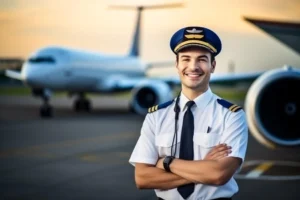Have you ever wanted to work as an airline pilot in India? This exciting and challenging line of work offers a unique combination of accountability, excitement, and international travel opportunities. There has never been a better moment to follow your passion, with the aviation sector in India expanding rapidly.
Wondering how to become an Airline Pilot? Recent reports indicate that India’s aviation industry is poised to become the third largest in the world by 2025, leading to a demand for thousands of new pilots. This means there are plenty of opportunities for aspiring pilots who are ready to embark on this rewarding journey.
However, becoming an airline pilot isn’t easy. It requires a combination of education, rigorous training, and significant flight experience. Prospective pilots must meet strict requirements and pass various exams to ensure they are capable of handling the challenges of flying commercial aircraft. In this article, we’ll guide you through the essential steps for how to become an airline pilot in India, from obtaining the necessary licenses to gaining the required flight hours.
Who is An Airline Pilot
An airline pilot is a highly trained professional responsible for operating commercial aircraft and ensuring the safe transport of passengers and cargo. They hold an Airline Transport Pilot (ATP) certificate, the highest level of aircraft pilot certification, which requires extensive training, rigorous examinations, and substantial flight experience.
In addition to their technical expertise, airline pilots must possess strong decision-making skills, situational awareness, and the ability to remain calm under pressure. They often work irregular hours, including nights, weekends, and holidays, and must adapt to various time zones and weather conditions.
What are Airline Pilot Rankings
- Captain: The captain sits to the left of the co-pilot and is the commander of the aircraft, responsible for the overall operation and safety of the flight.
- Senior First Officer: The senior first officer is the co-pilot and second in command, sitting to the right of the captain. They take over the flight in case the captain is unable to perform their duties.
- First Officer: The first officer, also a co-pilot, typically has less experience than the senior first officer and assists the captain in operating the aircraft.
- Second Officer: Some airlines employ second officers to take control during the cruise phase of the flight, allowing the captain and co-pilot to rest and prepare for landing.
Skills Required to Become An Airline Pilot

1. Communication Skills:
Pilots need excellent verbal communication and active listening abilities to ensure the safety and efficiency of flight operations. Effective communication with air traffic control, airline personnel, and passengers is essential for managing weather updates, traffic information, and emergencies.
2. Attention to Detail:
A strong focus on detail and situational awareness is crucial for maintaining control of the aircraft. Pilots must meticulously follow pre-flight checklists and identify potential issues that could affect the flight’s performance and safety.
3. Quick Thinking Skills:
Pilots must be able to think quickly and make sound decisions under pressure. In emergencies, they need to assess situations rapidly and determine the best course of action to ensure the safety of everyone on board.
4. Technical Skills:
Proficiency in mathematical calculations and aeronautical knowledge is vital. Pilots must operate complex aircraft systems and instruments accurately and efficiently, requiring strong technical aptitude.
5. Decision-Making Abilities:
Pilots must have strong decision-making skills, as they are responsible for the safety and efficiency of the flight. This involves making informed choices based on available data, experience, and judgment, often under time constraints and in high-pressure situations.
How to Become An Airline Pilot

1. Educational Foundation:
Start by earning a bachelor’s degree in aeronautical science or a related field. This degree not only provides essential knowledge but also meets the educational requirements of many commercial airlines. Ensure that the degree aligns with industry standards by researching the educational requirements of airlines operating in India.
2. Licensing and Certification:
Begin your journey with a private pilot license, often included in your formal education. Progress to acquiring a commercial pilot license, which requires a minimum of 250 flight hours. These hours must include 100 hours of pilot-in-command (PIC) time, 50 hours of cross-country PIC time, 10 hours of instrument training, and 10 hours of technically advanced airplane (TAA) training. These licenses are fundamental to establishing your credibility and capability as a pilot.
3. Building Flight Experience:
Gain substantial flight experience by accumulating at least 1,500 flight hours, which is a typical requirement for airline pilots. Work as a private or commercial pilot for about two years to gather these hours. Ensure that your flight experience includes 100 hours of night flight time, 250 hours of PIC time, 500 hours of cross-country flying, 75 hours of instrument training, and 50 hours in a specific rating such as multi-engine rating. This experience is crucial for meeting the stringent requirements of airlines.
4. Resume Enhancement:
Once you have the necessary experience and certifications, update your resume to reflect your qualifications. Include your educational background, instrument ratings, certifications, and relevant work history. List your flight hours to demonstrate your comprehensive aeronautical experience and preparedness for an airline pilot role.
5. Job Applications:
Search for airline pilot openings in India that align with your qualifications. Tailor your applications to highlight your education, experience, and certifications. Submit your updated resume along with a compelling cover letter that emphasizes your strengths and suitability for the role, showcasing your dedication and expertise in aviation.
6. Interview Preparation:
As you receive interview invitations, prepare diligently. Research the airlines thoroughly, understand their operations and values, and be ready to discuss your flight experience in detail. Demonstrating a deep knowledge of the airline and your readiness to contribute to their success will significantly enhance your chances of securing a pilot position.
What Does An Airline Pilot Do
A standard 9–5 job is very different from the unusual and hard schedule that airline pilots work. The average monthly flying time for airline pilots is approximately 75 hours, with an additional 150 hours for pre-flight inspections, weather condition checks, and flight planning. They have a combination of work and vacation days in their calendar, which gives them time to relax in between flights.
An airline pilot’s duties are extensive and essential to the safe functioning of aircraft. These include checking the aircraft both before and after each trip, making sure that the fuel supply and weight distribution are appropriate, and evaluating the weather for safety. Pilots prepare and submit flight plans to air traffic control, communicate via radio equipment, and control the aircraft during takeoff, landing, and cruising.
Conclusion
In conclusion, it takes commitment, a great deal of training, and a strong belief in safety and excellence to become an airline pilot in India. Despite its difficulties, the route offers a fulfilling career with lots of chances to travel and grow within the aviation sector. Being an airline pilot can be a rewarding and exciting career choice if you have the necessary training, credentials, and experience.
FAQ
1. How long does it take to become an airline pilot in India?
The process of becoming an airline pilot can take several years. Completing the necessary education and training, accumulating the required flight hours, and obtaining the necessary licenses typically takes around 4 to 6 years, depending on the individual’s pace and the availability of training opportunities.
2. What is the cost of pilot training in India?
Pilot training in India can be quite expensive, with costs ranging from INR 25 to 40 lakhs for obtaining a commercial pilot license. This includes the cost of flying hours, ground school, and other related expenses. Additional costs may apply for obtaining further ratings and certifications.
3. Are there any medical requirements for becoming an airline pilot in India?
Yes, aspiring airline pilots must meet strict medical standards. You need to pass a Class 1 medical examination conducted by a Directorate General of Civil Aviation (DGCA)-approved medical examiner. This examination ensures you are physically and mentally fit to operate an aircraft safely. Regular medical check-ups are also required to maintain your license.
